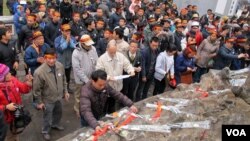HANOI —
Around 100 people marched through the center of Hanoi Sunday to commemorate the 35th anniversary of a brief but bloody border war with China.
Anti-China protesters marched around a lake in the center of Hanoi Sunday morning to commemorate 35 years since Chinese troops embarked on a near month-long invasion of northern Vietnam. Participants carried flowers and wore headbands that said “the people will never forget.”
Chinese troops moved in on February 17, 1979, shortly after Vietnam invaded Cambodia, which was at the time led by Chinese-ally the Khmer Rouge. Around 21,000 people are believed to have died on both sides, although neither government has released official figures.
The war is still a very sensitive subject in Vietnam because of the delicate diplomatic relationship with China. Student Kim Bich Ngoc, 20 years old, said her teachers warned her she would be kicked out of university if she attended anti-China protests.
" I never learned about it at school...The government don’t want Vietnamese people to know about that because they are afraid it will affect the relationship between Vietnam and China," said Ngoc.
The protesters had originally intended to lay the flowers at the statue of national icon Ly Thai To, but the area around the statue was packed with members of aerobics and ballroom dance clubs.
Many protesters said they believed the government had arranged the activities so they could not gather there.
Among the crowd was Nguyen Tri Dung, the son of political blogger Nguyen Van Hai, who wrote under the pen name Dieu Cay.
Nguyen Van Hai took part in protests as early as 2008 against Chinese territorial claims in the South China Sea, which overlap with Vietnam’s own claims. He is currently serving a 12-year prison sentence for conducting propaganda against the state.
Dung says he believes the Vietnamese government does not want people to learn about the border war with China.
"I had to find for myself the real history (about the war) on the Internet," he said. "I came here today to acknowledge the real history. I didn’t learn anything at school about it. I didn’t even know there was a war between the Vietnamese and Chinese at that time."
While the Vietnamese government does at times protest Chinese actions in areas of the South China Sea, which it also claims, coverage of the two countries diplomatic relations is strictly controlled in the Vietnamese media.
China is one of Vietnam’s largest trading partners. Dung says he believes this is why the government does not want young people to know about the war.
"I think it’s because the Vietnamese are afraid to tell the truth, to let the young people know... the government depends a lot on China," he said.
Similar rallies have often been broken up by police with tens of participants detained. Despite being closely followed by uniformed and plain-clothed police, the protesters were eventually allowed to lay flowers at a pagoda and go home.
Anti-China protesters marched around a lake in the center of Hanoi Sunday morning to commemorate 35 years since Chinese troops embarked on a near month-long invasion of northern Vietnam. Participants carried flowers and wore headbands that said “the people will never forget.”
Chinese troops moved in on February 17, 1979, shortly after Vietnam invaded Cambodia, which was at the time led by Chinese-ally the Khmer Rouge. Around 21,000 people are believed to have died on both sides, although neither government has released official figures.
The war is still a very sensitive subject in Vietnam because of the delicate diplomatic relationship with China. Student Kim Bich Ngoc, 20 years old, said her teachers warned her she would be kicked out of university if she attended anti-China protests.
" I never learned about it at school...The government don’t want Vietnamese people to know about that because they are afraid it will affect the relationship between Vietnam and China," said Ngoc.
The protesters had originally intended to lay the flowers at the statue of national icon Ly Thai To, but the area around the statue was packed with members of aerobics and ballroom dance clubs.
Many protesters said they believed the government had arranged the activities so they could not gather there.
Among the crowd was Nguyen Tri Dung, the son of political blogger Nguyen Van Hai, who wrote under the pen name Dieu Cay.
Nguyen Van Hai took part in protests as early as 2008 against Chinese territorial claims in the South China Sea, which overlap with Vietnam’s own claims. He is currently serving a 12-year prison sentence for conducting propaganda against the state.
Dung says he believes the Vietnamese government does not want people to learn about the border war with China.
"I had to find for myself the real history (about the war) on the Internet," he said. "I came here today to acknowledge the real history. I didn’t learn anything at school about it. I didn’t even know there was a war between the Vietnamese and Chinese at that time."
While the Vietnamese government does at times protest Chinese actions in areas of the South China Sea, which it also claims, coverage of the two countries diplomatic relations is strictly controlled in the Vietnamese media.
China is one of Vietnam’s largest trading partners. Dung says he believes this is why the government does not want young people to know about the war.
"I think it’s because the Vietnamese are afraid to tell the truth, to let the young people know... the government depends a lot on China," he said.
Similar rallies have often been broken up by police with tens of participants detained. Despite being closely followed by uniformed and plain-clothed police, the protesters were eventually allowed to lay flowers at a pagoda and go home.




